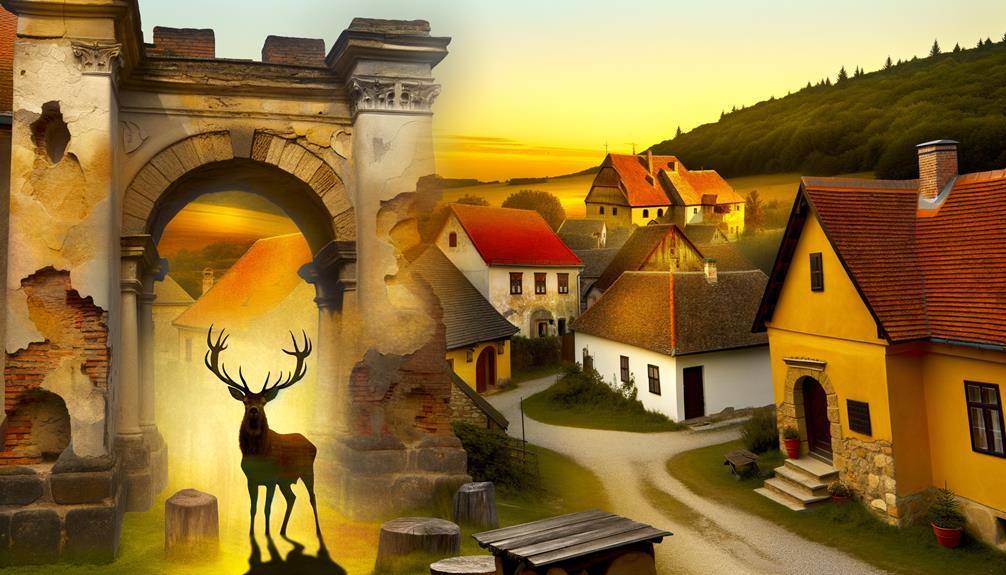Meaning of the Name Laszlo
The name Laszlo, originating from the Hungarian name László, traces its etymology to the Slavic name Vladislav, meaning 'rule' and 'glory'. It embodies ideals of leadership and honor, underscored by its association with King Saint Ladislaus I of Hungary, a significant figure who consolidated and expanded the Hungarian state.
The name gained prominence during his reign and remains influential in Hungarian culture, symbolizing valor and piety. Modern usage includes literary characters, scholars, and public figures, maintaining its relevance through a blend of historical depth and cultural richness.
More insights reveal its enduring appeal and cross-cultural adoption.

Key Takeaways
- Laszlo is derived from the Hungarian name Lázsló, which originates from the Slavic name Vladislav.
- The name means 'rule' and 'glory,' emphasizing leadership and honor.
- It gained prominence through King Saint Ladislaus I of Hungary.
- Laszlo symbolizes Hungarian identity, bravery, and cultural pride.
- The name remains popular for its historical and cultural significance in Hungary.
Etymology of Laszlo
The name Laszlo, derived from the Hungarian name László, traces its roots back to the Slavic name Vladislav, which means 'rule' and 'glory.'
This etymological connection highlights the intrinsic value placed on leadership and honor within the name. The transformation from Vladislav to László illustrates linguistic adaptation and cultural assimilation over time.
The Hungarian adaptation retains the core elements of its Slavic predecessor, preserving the connotations of power and prestige. This evolution underscores the fluid nature of language and the ways in which names adapt while maintaining their foundational meanings.
Such etymological analysis provides insight into cultural values and the historical significance embedded within a name, emphasizing its enduring relevance.
Historical Origins
The historical origins of the name Laszlo are deeply rooted in Hungarian royalty, greatly influencing its prominence and cultural significance.
The name's etymological roots trace back to ancient Slavic elements, which evolved over centuries to its current form.
This evolution reflects a complex interplay of linguistic, cultural, and historical factors that shaped its modern usage.
Hungarian Royalty Influence
Rooted deeply in Hungarian history, the name Laszlo finds its origins among the nation's royalty, particularly linked to King Saint Ladislaus I.
Ascending to the throne in 1077, Ladislaus I played a pivotal role in consolidating the Hungarian state and expanding its territories. His reign was marked by significant military and cultural achievements, which elevated his status to that of a national hero and saint.
The reverence for King Ladislaus I fostered the popularity of his name, perpetuating its use among noble families and commoners alike. This royal association imbued the name Laszlo with connotations of leadership, valor, and piety, attributes highly esteemed in Hungarian society.
Consequently, the name Laszlo became an enduring symbol of Hungarian heritage and identity.
Etymological Roots and Evolution
László, a name steeped in history, derives from the Slavic name Vladislav, which itself is composed of the elements 'vlad,' meaning 'rule,' and 'slav,' meaning 'glory.'
The name underwent significant evolution as it migrated into Hungarian culture, reflecting distinct linguistic influences and historical contexts.
- Slavic Origins: The original Slavic form, Vladislav, was prevalent among Slavic peoples and rulers.
- Hungarian Adaptation: As the name entered Hungarian usage, it transformed into László, aligning with local phonetics and orthographic practices.
- Medieval Popularity: The name's popularity surged during the reign of King Saint László I of Hungary, enhancing its prestige.
- Modern Usage: Today, László remains a common Hungarian name, symbolizing leadership and honor.
This progression underscores the dynamic nature of linguistic evolution.
Cultural Significance
In examining the cultural significance of the name Laszlo, one must consider its historical roots and enduring impact within Hungarian society. Laszlo, derived from the Slavic name Vladislav, meaning 'rule' and 'glory,' has deep connections to Hungarian nobility and leadership.
The name gained prominence through Saint Ladislaus I of Hungary, a revered king whose reign in the 11th century symbolized strength and justice. Over centuries, Laszlo has become emblematic of Hungarian identity, embodying attributes of bravery, wisdom, and cultural pride. Its frequent use in naming traditions reflects a collective reverence for historical figures who have shaped Hungary's legacy.
Consequently, the name Laszlo not only serves as a personal identifier but also as a cultural touchstone.
Laszlo in Literature
The name Laszlo has appeared in various literary contexts, both in classic literature and modern works. In classic literature, Laszlo often symbolizes nobility and intellectual prowess, reflecting its historical roots.
Contemporary authors have also employed the name to convey similar themes, while sometimes imbuing it with modern complexities and cultural nuances.
Classic Literature References
Many classic works of literature have featured characters named Laszlo, showcasing the name's cultural and historical significance. These literary references not only highlight the name's origins but also its diverse representations.
Here are four notable examples:
- 'War and Peace' by Leo Tolstoy: Laszlo appears as a minor character, symbolizing the Hungarian influence in Russian society.
- 'The Brothers Karamazov' by Fyodor Dostoevsky: A character named Laszlo adds depth to the novel's exploration of moral dilemmas.
- 'The Magic Mountain' by Thomas Mann: Laszlo embodies the intellectual currents of early 20th-century Europe.
- 'Les Misérables' by Victor Hugo: Laszlo is depicted as a compassionate figure, reflecting the broader humanitarian themes of the novel.
These examples underscore the name's versatility and enduring appeal in classical literature.
Modern Literary Usage
How has the name Laszlo evolved in modern literature to reflect contemporary themes and societal changes?
In recent works, the name Laszlo is often employed to symbolize intellectualism and complexity, resonating with characters who grapple with multifaceted moral and existential dilemmas. This evolution mirrors a broader literary trend towards nuanced character development and intricate plotlines, reflecting contemporary societal preoccupations with identity, ethics, and the human condition.
Moreover, Laszlo frequently appears in genres exploring dystopian futures and speculative fiction, embodying the archetype of the innovative thinker or the morally ambiguous anti-hero. This usage underscores the adaptability of the name in adapting timeless qualities to modern narratives, thereby maintaining its relevance across evolving literary landscapes.
Famous Namesakes
Numerous notable individuals named Laszlo have left a significant impact across various fields, underscoring the name's historical and cultural resonance. Prominent figures include:
- László Bíró: The Hungarian-Argentinian inventor renowned for creating the modern ballpoint pen, revolutionizing writing instruments globally.
- László Moholy-Nagy: A pioneering artist and educator in the Bauhaus movement, recognized for his contributions to photography, painting, and industrial design.
- László Lovász: A mathematician whose work in combinatorial optimization and graph theory earned him the prestigious Abel Prize.
- László Papp: A legendary Hungarian boxer, celebrated for being the first boxer to win three consecutive Olympic gold medals.
These individuals exemplify the name Laszlo's association with innovation, creativity, and excellence across diverse domains.
Popularity Over Time
The popularity of the name Laszlo has experienced significant fluctuations over time, influenced by historical events, cultural shifts, and prominent figures. Analyzing the name's trajectory reveals periods of increased and decreased usage. The table below illustrates the popularity trends of the name Laszlo over the past century, segmented by decade.
| Decade | Popularity Rank | Notable Events Influencing Popularity |
|---|---|---|
| 1920s | Moderate | Hungarian immigration wave |
| 1940s | High | WWII and the rise of Hungarian heroes |
| 1960s | Decline | Cultural assimilation |
| 1980s | Low | Lesser media representation |
| 2000s | Resurgence | Renewed interest in unique names |
This data highlights the name's dynamic nature and its responsiveness to broader societal trends. Understanding these shifts provides valuable context for the current perception of the name Laszlo.
Modern Usage
In contemporary settings, the name Laszlo is increasingly embraced for its distinctive European heritage and cultural importance. This name, rooted in Hungarian tradition, is gaining traction globally due to its unique phonetic appeal and historic resonance.
Modern usage of the name Laszlo can be observed in various domains:
- Cultural Representation: Laszlo appears in literary works, films, and television series, often symbolizing a character with depth and a rich backstory.
- Academic Circles: Many scholars and intellectuals named Laszlo contribute significantly to fields like mathematics, physics, and humanities.
- Popular Culture: Celebrities and public figures with the name enhance its visibility and desirability.
- Global Adoption: Parents across different cultures are choosing Laszlo for its sophisticated sound and meaningful heritage.
These factors collectively underscore the name's enduring modern appeal.
Conclusion
The name 'Laszlo' emerges as a vessel of cultural richness and historical depth, carrying its etymological roots from ancient lands to contemporary society. Its footprint in literature and prominence among famous namesakes illustrate its enduring resonance.
The name's journey through time, marked by fluctuating popularity, underscores its dynamic nature. Like a tapestry woven with intricate threads, the essence of 'Laszlo' encapsulates a blend of tradition, influence, and modern relevance, continuing to thrive in the present day.






